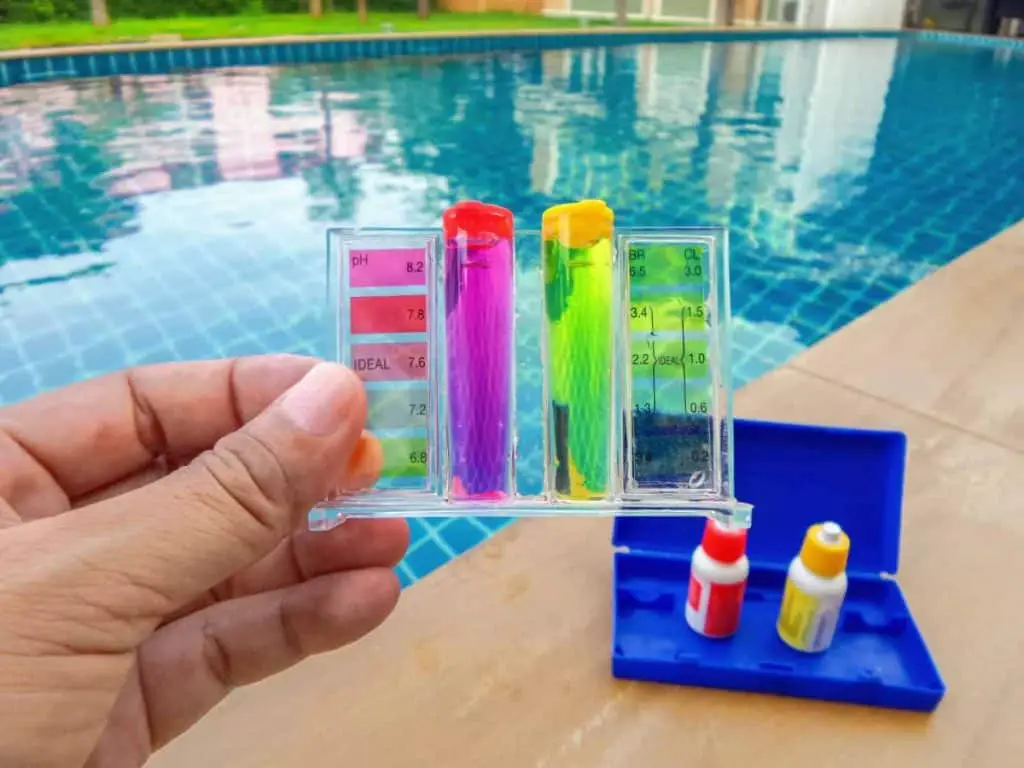
You don’t have to be an expert to manage your pool’s water chemistry, like ph and alkalinity levels. Sometime adding muriatic acid can do the trick, but be sure you don’t just start pouring some in, because sometimes you can be doing more harm than good.
What is Muriatic Acid?
Muriatic acid is a less pure version of hydrochloric acid. It can be extremely toxic and corrosive that should be handled very carefully, but it’s one of the most effective ways of balancing pH levels in water.
Muriatic acid can also be used for other things such as cleaning pool tiles, removing rust stains, killing mold and cleaning pool surfaces. So basically it’s not only for balancing pH levels but also for scrubbing pool surfaces to keep them clean.
What is pH?
pH is a measurement of the hydrogen ion concentration in pool water. The pH of pool water can affect the pool maintenance as well the comfort of swimmers.
pH technically stands for “protens hydrogen” or “power of hydrogen.” Water is easily ionized and conduct electricity, so that will always contain some level of hydrogen ions. The pH scale range is exponential and set up the lower the pH level is, the more acidic the pool water gets. The higher the pH level is, the alkaline it is.
How Much Acid Should I Add to My Pool?
This depends on how high your pool’s high pH level is and the size of your pool. If you test your pool water with test strips, it can be hard to get the exact pH level; you only know if it’s high. A better way to test your pH level is to use a DPD drop test kit. DPD drop test kits use phenol red to give you a much better idea of your pH levels.
If you pH level is at 7.8 or higher, and an average in-ground swimming pool around 15,000 gallons, you should add about 1/4 gallon (a quart) of muriatic acid. You will want to retest your pH level after your pool water has circulated for an hour. If you have an above-ground or smaller pool, you will want to start with one cup of muriatic acid. You will want to re-test it after an hour and add muriatic acid if you have not reached the optimal pH levels.
For a more exact idea of how much muriatic acid to add, we have added a table with pH levels along with gallons of water that you can reference.
| pH | 1,000 gal | 5,000 gal | 10,000 gal | 15,000 gal | 20,000 gal | 25,000 gal | 50,000 gal |
| 7.6-7.8 | 1 1/4 oz. | 6 oz. | 12 oz. | 18 oz. | 24 oz. | 1 qt. | 2 qts. |
| 7.8-8.0 | 1 1/2 oz. | 8 oz. | 16 oz. | 24 oz. | 1 qt. | 1 1/4 qts. | 2 1/2 qts |
| 8.0-8.4 | 2 1/2 oz. | 12 oz. | 24 oz. | 1 1/4 qts. | 1 1/2 qts. | 2 qts. | 1 gal. |
| Above 8.4 | 3 oz. | 16 oz. | 1 qt. | 1 1/2 qts. | 2 qts. | 2 1/2 qts | 1 1/4 gal. |
How to Add Muriatic Acid
When you are getting ready to add the acid, make sure your pool pump is running so it circulates the pool water. Make sure you are also wearing safety protection such as eye protection and acid resistant gloves. Pour the acid into the deepest part of your pool and wait at an hour before using the pool. You will want to wait 24 hours until you test your pH level for accurate results.
What Happens if You Add Too Much Muriatic Acid Into a Pool?
The short answer, nothing good. If you add too much acid, you will drive the pool’s water pH level below a 7.0 which means it will start to eat away at any cement or metallic parts of your pool or equipment that has contact with the water.
Etching the pool will make the plaster rough and cause the pebbles to loosen from a pebble finish. If you have modern equipment, you will not have to worry about metals getting corroded. But if you have a pool heater, the low pH level can make the stainless steel corrode.
Can You Add Chlorine and Muriatic Acid at the Same Time?
No! You want to make sure you never add chlorine and muriatic acid at the same time because together they can make a toxic gas. A good rule to follow when adding pool chemicals is to wait at least an hour before adding any other chemicals to a pool. Keep in mind that muriatic acid is very dangerous so you want to be very cautious as they can be bad for your lungs, skin and eyes.
Muriatic Acid vs. Sulfuric Acid
Many people use sulfuric acid instead of muriatic acid to lower the pH levels in the pool. When you compare muriatic acid vs. sulfuric acid, both can get the job done. However, many use muriatic acid because it has no side effects unlike sulfuric acid. It’s also much cheaper, which is a big plus for most people.
Sulfuric acid can be much more harmful than muriatic acid and can be much harder to obtain and cost more too. Sulfuric acid can burn your skin very quickly, where muriatic acid is known for creating more fumes that can be toxic.
While you are trying to decide which acid to use, keep in mind that sulfuric acid can increase the concentration of sulfate to the water which increase the risk of stainless steel corrosion.
Muriatic Acid vs. Hydrochloric Acid
Many people think that muriatic acid and hydrochloric acid are two different types of acids. In fact, they essentially the same chemical with very little to separate the two. The main difference between muriatic acid and hydrochloric acid is the presence of contaminants. Muriatic acid is a less pure version of hydrochloric acid and has a lower Baume rating.
You will better off using muriatic acid due to it having no side effects. It’s also much cheaper and be safer to use which is a big plus.

